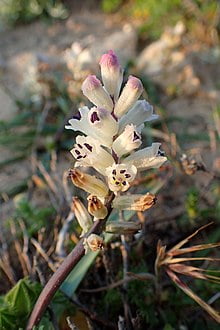Bellevalia

Bellevalia is a genus of plants in the family Asparagaceae, subfamily Scilloideae.[3] It was first described as a genus in 1808.[4][5]
The approximately 65 species are found from the Mediterranean: Turkey (about 12 species) and Israel (12 species), to central Asia: Iran, Afghanistan and Pakistan (two species).
Bellevalia species are perennial herbaceous plants. As geophytes, they form bulbs with a membranous sheath (“tunic”). The simple, parallel-veined leaves are basal. Grape-like inflorescences grow terminally on smooth cylindrical flower stems. The numerous flowers are located in the axils of small, membranous bracts. The hermaphroditic flowers are triple. The six identically shaped bracts are one-third to one-half their length and deformed tubular, bell-shaped or funnel-shaped in form. The color of the bracts ranges from white to cream to brown or more rarely from blue to purple. The fruit capsule is triangular in cross section with winged edges. The seeds are more or less spherical, rarely elongated and glossy.
The genus Bellevalia was first described in 1808 by Philippe-Isidore Picot de Lapeyrouse.[6] The genus name honors the French botanist Pierre Richer de Belleval (1564-1632).[7] A synonym for Bellevalia is Strangweja Bertol. The homonym genus Bellevalia Roem. & Schult. is a synonym of the genus Richeria Vahl from the family Phyllanthaceae.
